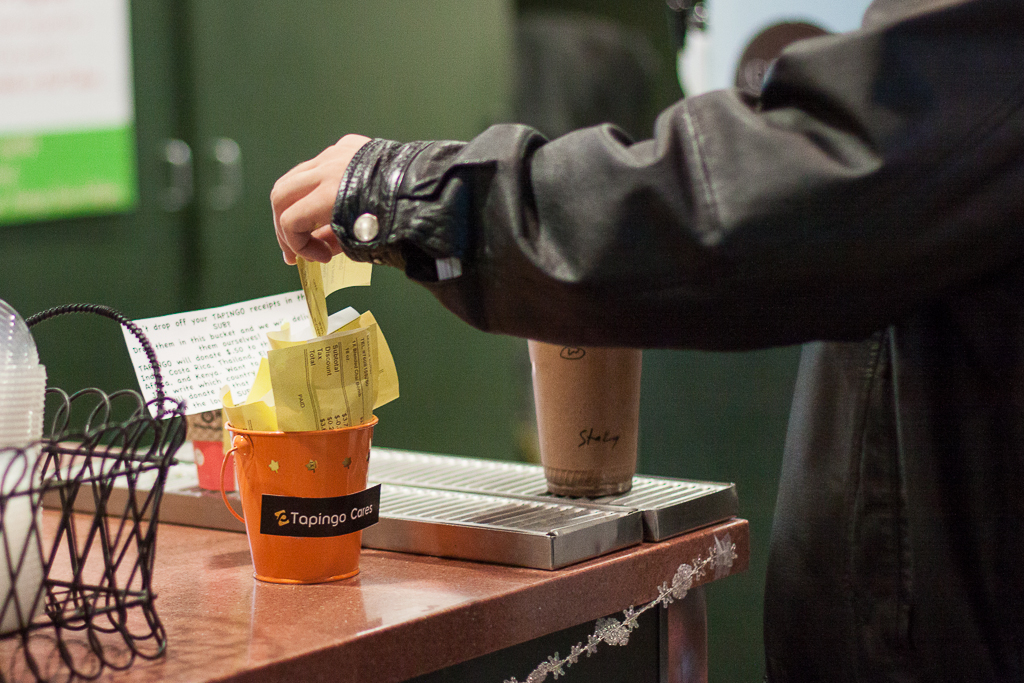
Online meal-ordering service Tapingo has extended the end date of the fundraiser they have been holding over the past two weeks to benefit mission teams. Students who used Tapingo were able to drop their receipts in designated containers in the Student Union Building or the container at Common Grounds, and Tapingo will donate $0.50 per receipt to the team or ministry represented on the container.
Instead of ending on Nov. 16 as originally planned, the fundraiser will stop at the end of the month on Friday. Whichever ministry team receives the most receipts will win $100 of catering at their next meeting.
“Biola costs a ton of money, so monetary donations as a poor college student aren't my first method of helping out,” said junior business major Paige Erickson.
As a Biola student and intern at a marketing firm whose client is Tapingo, Erickson wanted to figure out a way for students to give to a charity without breaking the bank.
“This campaign was a way I could use business as missions and use my internship to allow myself and fellow students an opportunity to give money,” she said.
Erickson mentioned there may be more Tapingo contests in the future.
Erickson said that after the fundraising campaign, she hasn’t decided what the next promotion will be.
“The Tapingo Cares campaign seems to have worked well and there has been a ton of student involvement,” she said.
Tapingo Cares is not the only means student groups have for raising mission trip funds. When students commit to going on a trip, they have to sign an agreement that says they will do their part to help raise money for their team, according to sophomore sociology major Becca Harlow. That way, she said, no one slacks off.
“You raise money on your own … but they don’t put pressure on you individually,” she said.
Harlow’s trip to South Africa will cost $2,800.
“How we get the most funds is by sending out support letters. Each team has a night where they will come together and write their support letter … then they have two hours where they stuff their envelopes. After that everything is done as a team,” Harlow said.
Other ways teams are raising money
Each team is matched with a team development leader who gives them ideas to fundraise, according to junior Lucy Harig, SMU director of short-term missions.
SMU office assistant junior Ciara Springer said teams will often host phone-a-thons. They will spend time calling the people who were sent support letters, but have yet to donate, to ask for financial support and prayer.
Teams also hold events to help raise money together.
“Each team is in charge of crafting their personal fundraiser, like the El Salvador team who had a pool party that raised about $1,000,” Springer said.
In the afternoon, mission teams can often be found selling T-shirts designed by an SMU designer. The shirts are sold in front of the Caf to benefit their specific team, Springer said.
Megan Beatty, a junior math major, sat outside the Caf on Nov. 27, selling tank tops for Team India.
Beatty said Team India wants to come up with different ways to fundraise, such as a henna booth or a drive-in on top of the parking structure.
At Friday’s Christmas tree lighting, all the teams will have booths set up to allow students to stop by, ask questions or pray with them. Team Kenya will also be selling scarves and headbands they’ve crocheted.
“We get most of our money from support letters, but I have to trust God,” said sophomore English major, Torrey Allen, a member of team India. “He always comes through.”







